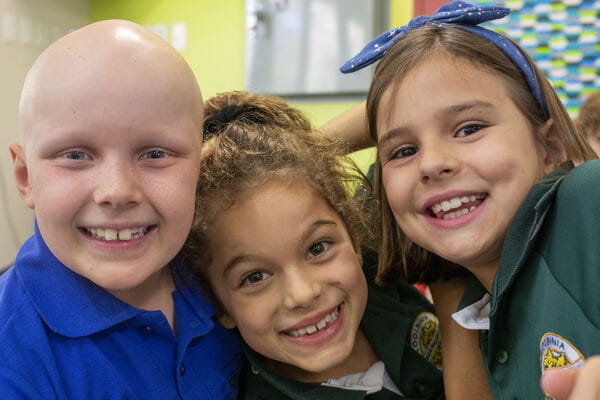Overview
Alignment with Be You Domains
-
Mentally Healthy Communities
-
Learning Resilience
-
Early Support
-
Responding Together
Alignment with Early Years Learning Framework (EYLF)
- Children are confident and involved learners
- Children are connected with and contribute to their world
- Children are effective communicators
- Children have a strong sense of identity
- Children have a strong sense of wellbeing
Alignment with Australian Curriculum
- Health and PE
Target audience
- Early learning
- Primary school
Target groups
- Small group
- Whole class
Aims
The b kinder workbooks aim to build empathy, compassion, resilience and confidence while helping children to identify and develop their strengths and self-regulate their emotions. It also supports discussions about emotions that can be difficult for children to identify and communicate. The activities support primary school teachers to meet the specific learning outcomes for each stage associated with Personal and Social Capability, one of the General Capabilities outlined in the Australian Curriculum.Program theory
The b kinder workbooks have been developed by educators and psychologists as interactive learning tools that initiate questions and address what it means to be kind. Social impact reports carried out on the workbooks have identified a shift in children's wellbeing in the areas of relationship skills, connection and purpose, and coping and adaptability.Topics
Topics include kindness, empathy, compassion, gratitude, resilience, taking action, role models, healthy relationships, leadership, injustice and legacy. The workbooks can also be used with programs such as Bounce Back, Grow Your Mind, URSTRONG: Friendology 101, and the Resilience Project School Partnership Program.Cost
Program structure
Educators deliver the program over 10 weeks (one term). Units of work can be taught as presented or adapted to suit the learning community's needs. The number of delivery hours is flexible because each topic can be elaborated on and extended. Ideally, the b kinder workbooks are used in Term 2 to coincide with the annual 'b kinder day' on 22 June.Instructor
Not provided
Instructor training
Not provided
Supporting resources or materials available with program
Not provided
Ongoing support
The b kinder foundation provides support if required and educators have access to peer educators through the b kinder school network, which launches in 2023.Parent involvement
- None
Origin of program
Australia
b kinder foundation
Program authors
Billie Kinder, Danny Mayson-Kinder, Dr Cathie Harrison
- 83 Birchgrove Road,Birchgrove NSW 2041 Australia
Ratings
Summary of evidence factors
This is a summary of the evaluation or research study characteristics that contribute to the program’s evidence rating.
|
Positive impact on at least one outcome for children and/or young people?
The study reported positive outcomes. |
Yes |
|---|---|
|
Link between program description and theory of change
Theory of change refers to whether there was a comprehensive description and illustration of how and why a desired change is expected to happen in a particular context. |
Comprehensive |
|
Study design
Type of study design reported. |
Pre-post cohort |
|
Independence
The degree to which the program authors were involved in the research. |
Completely |
Summary of implementation factors
This is a summary of the program’s characteristics that contribute to its implementation rating.
|
Feedback sought from participants
Participants enjoyed the program and understood its benefits. |
Yes |
|---|---|
|
Feedback sought from instructors
Instructors enjoyed the program and understood its benefits. |
No |
|
Groups program is not suitable for
Groups the program wouldn't be suitable for or that required further research to determine suitability. |
Not assessed |
|
Training provided during study
The model of training provided. |
Face to face train-the-trainer in person |
|
Ongoing instructor support provided during study
Whether ongoing support is provided. |
Yes |
Context
This is a summary of the context in which the evidence for the program was established.
|
Study Participants
Pre school, primary school (Foundation to Year 6), secondary school (Years 7 to 12). |
Primary school |
|---|---|
|
Country of Study/s
The location in which the evidence or research was conducted. |
Australia |
|
Location of Study/s in Australia
The state (or states) the program was assessed in Australia. |
NSW QLD |
|
Evaluation of program in culturally and linguistically diverse populations
Provider has included culturally and linguistically diverse people when assessing the program. |
No |
|
Evaluation of program in Aboriginal and Torres Strait Islander children and young people
Provider has included Aboriginal and Torres Strait Islander peoples when assessing the program. |
No |
|
Evaluation of program in low socioeconomic groups
Program has evaluated a diverse socio-economic population in their research. |
No |
|
Developmental based adaptations to program design and delivery
Shorter sessions for younger students or activities are adjusted for age appropriateness. |
No |
|
Evaluation of program in children and young people with disability and/or learning difference
Provider has included participants with a disability or learning difference when assessing the program. |
No |
Last updated: 22 May 2025
